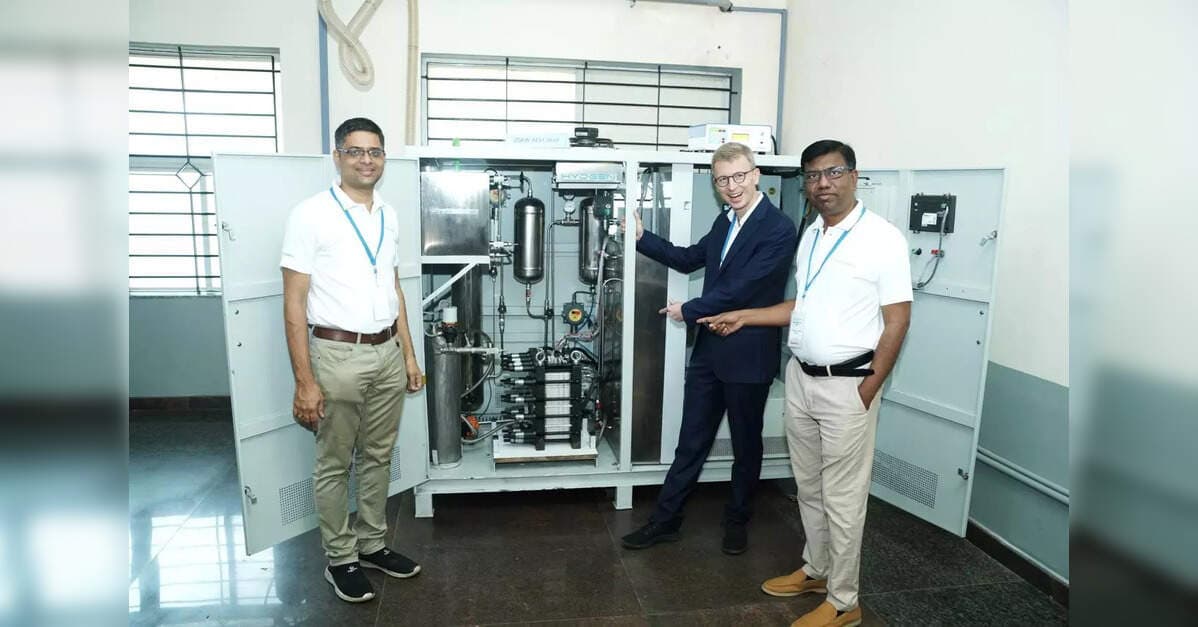HYDGEN

Overview
HYDGEN is a technology startup specializing in the production of green hydrogen through decentralized and on-demand solutions. Founded as a spin-off from the National University of Singapore in 2024, HYDGEN focuses on developing Anion Exchange Membrane (AEM) electrolyzers. The company's innovative approach allows for cost-effective hydrogen production at industrial scales. Headquartered in Singapore, with significant operations in Mangaluru, India, HYDGEN's founders include Dr. Manipaddy Krishna Kumar, Goutam Kumar Dalapati, and Michael Gryseels. As of 2025, HYDGEN has raised approximately $6.49 million in funding over several rounds, primarily aimed at R&D and market expansion.
Recent Developments
- October 2025: HYDGEN raised $5 million in funding led by Transition VC, with participation from Cloudberry Pioneer Investments and Moringa Ventures. The funding aims to expand production capabilities and market reach, including upgrading the Mangaluru facility to a semi-automated line and increasing single-stack capacity to 250 kW.
- October 2025: HYDGEN was recognized for its innovative AEM electrolyzers capable of scaling to industrial levels while maintaining cost leadership, indicating a shift from research to commercial readiness.
- August 2025: HYDGEN joined RMI’s Third Derivative Climate Tech Accelerator, accelerating its global expansion plans.
- March 2025: HYDGEN won the ELECRAMA 2025 Startup Competition, boosting its market credibility following a successful seed funding closure.
- Early 2025: The company expanded its pilot deployments across India and Southeast Asia, with several partners transitioning to commercial-scale operations, showcasing HYDGEN's technological advancements and market demand.
Company Information
| Attribute | Information |
|---|---|
| Founding Date | 2024 |
| Headquarters | Singapore |
| Founders | Dr. Manipaddy Krishna Kumar, Goutam Kumar Dalapati, Michael Gryseels |
| Revenue | Not publicly disclosed |
| Profits | Not publicly disclosed |
| Key Investors | Transition VC, Cloudberry Pioneer Investments, Moringa Ventures |
| Industry | Hydrogen Production Technology |
| Number of Employees | 11-50 |
Early History
HYDGEN originated as a spin-off project from the National University of Singapore, which provided it an academic foundation and initial support through its research grants. Focused on decentralizing hydrogen production, HYDGEN developed unique electrolyzer technologies that combine cost-efficiency with environmental sustainability. In its initial days, the company concentrated on research and development, which culminated in the creation of its proprietary AEM electrolyzers with support from the Singapore National Research Foundation. The founders aimed to address the inefficiencies in hydrogen supply chains by providing on-site production solutions for industries.
Company Profile and Achievements
HYDGEN's business model revolves around the development and deployment of AEM electrolyzers for green hydrogen production. These electrolyzers are designed to be scalable, aiming to meet industrial demands while reducing the costs associated with hydrogen transportation and storage. HYDGEN's hybrid approach combines elements of alkaline and PEM technologies, providing operational flexibility without the high costs of platinum-group metals.
- Strategic Innovations: Development of a range of electrolyzers from 1 kW to 100 kW, with a 250 kW model in progress.
- Technological Edge: HYDGEN's electrolyzers integrate proprietary catalyst and membrane designs for enhanced power efficiency and cost-effectiveness.
- Market Expansion: The company has successfully launched pilot projects across Asia and aims to expand into European and Middle Eastern markets, leveraging the growing demand for industrial hydrogen solutions.
- Accolades: HYDGEN has been recognized in various clean-tech circles and competitions, enhancing its reputation as a leader in the hydrogen industry.
Current Operations and Market Position
HYDGEN operates primarily in the renewable energy equipment sector, focusing on hydrogen electrolyzers. The company has established its presence in the Asian market, with sights set on expanding into other global regions experiencing rapid industrial hydrogen adoption. Its strategic move to integrate automation in manufacturing underscores its commitment to scaling operations efficiently. HYDGEN's competitive advantage lies in its ability to provide modular, cost-effective hydrogen solutions that cater to the decentralized needs of industries, thereby positioning itself as a crucial player in the green hydrogen market.
Conclusion
HYDGEN stands at the forefront of the hydrogen industry with its innovative approach to on-demand, decentralized green hydrogen production. Its continuous focus on technological advancements and strategic market expansion positions it as a significant player in the transition to sustainable energy solutions. As industries increasingly seek cost-efficient and reliable energy sources, HYDGEN's solutions are poised to impact various sectors heavily dependent on hydrogen. The company's future trajectory appears promising, driven by ongoing R&D, strategic investments, and a commitment to expanding its geographical footprint, while addressing ongoing challenges in production cost and scalability.